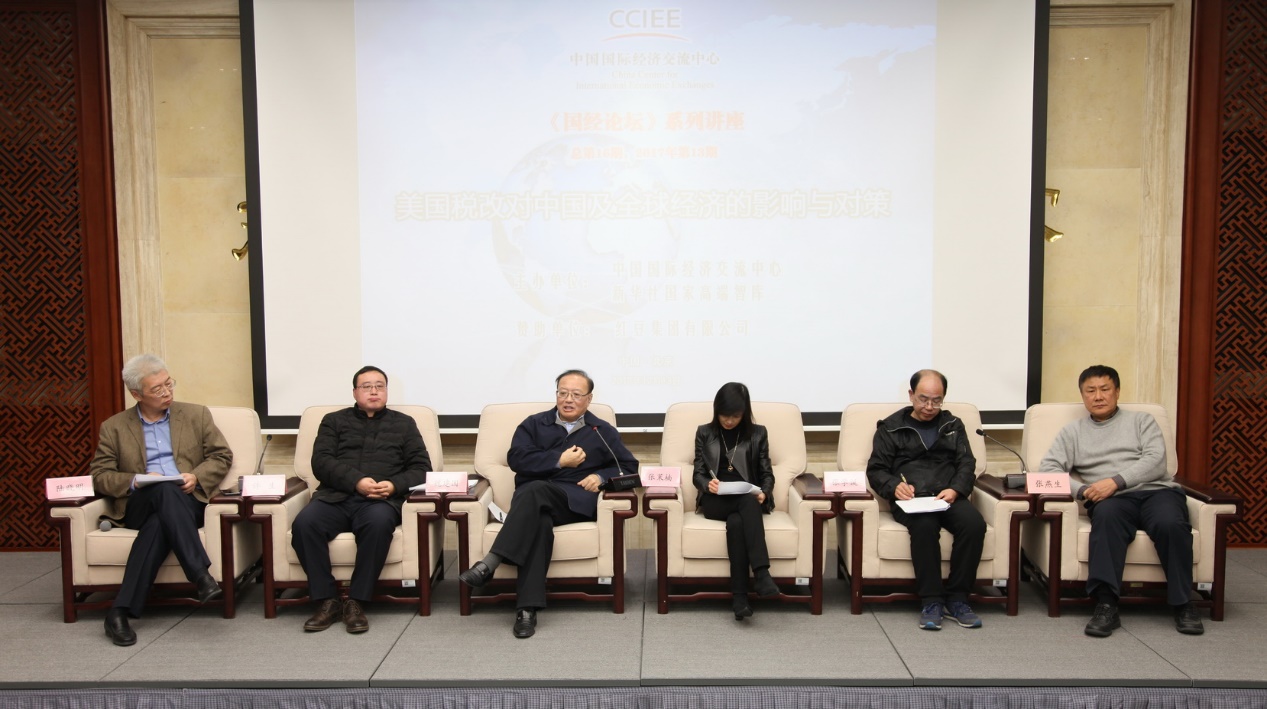16th CCIEE Symposium: American Tax Reform: Impact and Countermeasures
- Time:2017-12-13
- source:CCIEE
On November 16 and December 2, 2017, both the US senate and the House of Representatives approved their proposed tax reforms respectively. However, the proposals have not yet been submitted to president Trump due to their differences. Trump hopes that they can reach a consensus before Christmas. How will the tax reform impact the U.S. economy, China’s economy and the global economy as a whole? This is a issue concerning people around the world today.

On December 13, 2017, CCIEE and Xinhua News Agency National High-end Think Tank jointly organized the 16th CCIEE Symposium, aiming to analyze how will the tax reform impact China’s economy and the global economy? How should the rest of the world deal with it? Wei Jianguo, Vice Chairman of CCIEE made a short remark at the beginning of the symposium, followed by the presentations delivered by distinguished speakers, including Zhang Monan, Researcher of CCIEE, Xu Sheng, Director of Finance and Taxation Research Department, Economic Research Institute of National Development and Reform Commission, Zhang Xuedan, Director of the Public Revenue Research Center of China Academy of Fiscal Sciences, Zhang Yansheng, Chief Researcher of CCIEE. Lu Xiaoming, Researcher of the Economic Research Center at the Xinhua News Agency National High-end Think Tank, chaired the meeting.
The participating experts had an in-depth discussion on how will Trump’s tax reform impact the global and China’s economy. Under the guidance of the “America first”, the tax reform is a key measure taken by the Trump administration to enhance its global leadership and national strength. For a long time, the heavy tax burden and complex tax system have affected the competitiveness of American enterprises and the efficiency of the business environment. By reducing business costs through tax reform, the Trump administrations hopes to attract global industry and capital to the United States. In the short term, the tax reform is aimed to create employment. In the medium and long-term, it will reshape the international competitiveness of the United States and fulfill its campaign objective of “making the United States great again.”
Experts believe that the tax reform has four goals to achieve, namely, simplifying the tax system, lowering the tax rate, creating fair market conditions and bringing the overseas assets back to the US. Indeed, all these will help the US to boost economic growth, employment and investment growth, as well as bringing the cross-border capital inflows and the return of the dollar. However, it will also enlarge the rich-poor gap, trigger a new round of global tax breaks and tax competition, and further increase US fiscal and debt burdens, thereby affecting the dollar exchange rate and increasing US current account deficits. Against this backdrop, China should pay close attention to the impact of the tax cuts and its global spillover effect, promote the reform of China’s taxation system, and actively respond to the possible increase in US-China Trade imbalances caused by the tax cuts and prevent any other potential risks.
In the Q&A section, experts answered various questions from the media and audience. Researchers from CCIEE, representatives from enterprises, research institutions and news agencies took part in the event.
